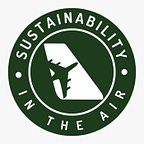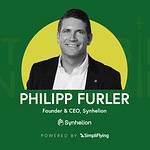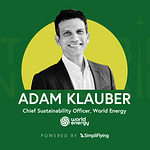In this episode of our ‘Sustainability in the Air’ podcast, Ed Mason, Founder & CEO of Jet Zero Australia, speaks with SimpliFlying’s CEO Shashank Nigam and shares insights into the company’s ambitious projects to produce sustainable aviation fuel (SAF) at a commercial scale.
Jet Zero Australia is an Australian bioenergy company that aims to develop the country’s first Alcohol-to-Jet (ATJ) facility for SAF.
Here are the key highlights of the conversation:
Introduction to Jet Zero Australia’s SAF Projects (2:20)
The Alcohol-to-Jet SAF pathway and licensing LanzaJet technology (6:45)
Sourcing feedstock for SAF production (8:40)
The Australian context: emissions and SAF potential (17:50)
Government support and policy environment (25:55)
Book and Claim System (32:20)
Scaling Up and Future Projects (35:45)
Australia’s potential in the global SAF market (39:20)
Rapid Fire! (40:58)
Keep reading for a quick overview of the episode.
Why Alcohol-to-Jet SAF matters for Australia
Jet Zero Australia seeks to leverage Australia’s excess ethanol supply, derived from agricultural byproducts, as feedstock for SAF. This allows the company to utilise existing resources without the need to develop new feedstock sources for their ATJ SAF facility.
The excess ethanol supply in Australia stems from a decade old attempt in the country to adopt biofuels, with anticipation of potential mandates to support ethanol production, explains Mason. However, the mandates never materialised on federal level. Only two states in Australia – New South Wales and Queensland – have mandated the sale of ethanol blended fuels, but they do not enforce it, Mason adds.
4 takeaways from the conversation
1. Jet Zero Australia’s SAF projects
Jet Zero Australia has two upcoming SAF projects which aim to establish Australia as a major player in the SAF market:
Project Ulysses: Project Ulysses is a $600 million venture located in Townsville, Queensland. It aims to use alcohol-to-jet technology licensed from LanzaJet to produce over 102 million litres of SAF and 11 million litres of renewable diesel per annum. LanzaJet’s first commercial-scale ATJ facility, LanzaJet Freedom Pines Fuels in Georgia, will serve as a reference point for Project Ulysses, which is three times larger than Freedom Pines.
Project Mandala: Project Mandala is a 50:50 Joint Venture between Jet Zero Australia and Aperion Bioenergy to develop low carbon intensity feedstocks in Australia. The focus is on utilising waste oils and non-edible crops to produce Hydrotreated Esters and Fatty Acids (HEFA) for Sustainable Aviation Fuel (SAF).
“I think Australia, and in particular our project Ulysses, is producing a very high quality [SAF] product. We are using agricultural byproducts, and we have a very low carbon intensity score compared to what we’re seeing elsewhere.”
2. Government support and policy
Due to Australia’s vast size and geographic location, aviation remains essential for both freight and passenger transport. The aviation industry accounts for roughly 1% of the country’s greenhouse gas emissions, with most of the emissions from medium to long haul flights. On a per capita basis, Australia is second only to the US in terms of annual emissions from domestic flights. To substantially cut aviation emissions, the Australian government is pushing for a shift to alternative fuels, specifically SAF.
In 2023, the Australian Renewable Energy Agency (ARENA), on behalf of the Australian Government, announced a $30 million SAF Funding Initiative to promote the SAF industry in Australia using renewable feedstocks. The initiative will explore opportunities across the SAF supply chain, from feedstock supply to final SAF production, aiming to support and expand the domestic SAF industry.
Government support has been instrumental for Jet Zero Australia’s progress, especially from the state government of Queensland, which has set out a 10-year biofuel roadmap and support for renewable energy projects. Mason also highlights the strong bipartisan support for the SAF industry in Australia, not just for its environmental benefits but also for job creation and fuel security.
“Getting this industry up here [in Australia] isn’t about just necessarily the full time jobs or the construction jobs, but we’re impacting a fairly big aviation energy industry here. And when we work it out, it’s around 350,000 people that down the supply chain are impacted by the development of SAF in this country.”
3. Book and claim registry for Australia
Jet Zero Australia plans to distribute their SAF primarily through shipping, given their proximity to the port in Townsville. The company is also looking to use ‘book and claim’ to further its SAF distribution strategy. Mason explains that even though the physical SAF might be used regionally to keep the carbon intensity score low, the environmental benefits can be claimed by airlines or customers anywhere through the book and claim system.
Earlier this year, Jet Zero Australia partnered with Trovio to develop a ‘Book and Claim’ Registry for Australian SAF and renewable diesel. This registry will act as a central tracking system throughout the supply chain, and will capture and retain data on the origin and characteristics of these fuels, ensuring they meet the necessary standards for issuing tradable credits. The registry is expected to be operational before the completion of Project Ulysses.
4. Partnerships and investments
Jet Zero Australia has secured strategic partnerships with Qantas, Airbus, and more recently, Idemitsu for both financial support and credibility.
Qantas has committed to having 10% of its fuel as SAF by 2030, amounting to approximately 600 million litres of fuel. Airbus too has committed to decarbonising its operations, and addressing its Scope 3 emissions by supporting SAF development and encouraging its adoption among its customers.
Similarly, Idemitsu represents several Japanese airlines obligated to achieve the 10% SAF target by 2030, thus driving their interest in sourcing SAF, says Mason. He also emphasises that unlike Australia’s “false start” in biofuels, current global mandates are ensuring sustained demand, presenting a significant opportunity for Australia to lead SAF development.
‘Sustainability in the Air’ is the world’s leading podcast dedicated to sustainable aviation. Through in-depth conversations with top aviation leaders, we break through the clutter and provide a clear roadmap for a net-zero future.













